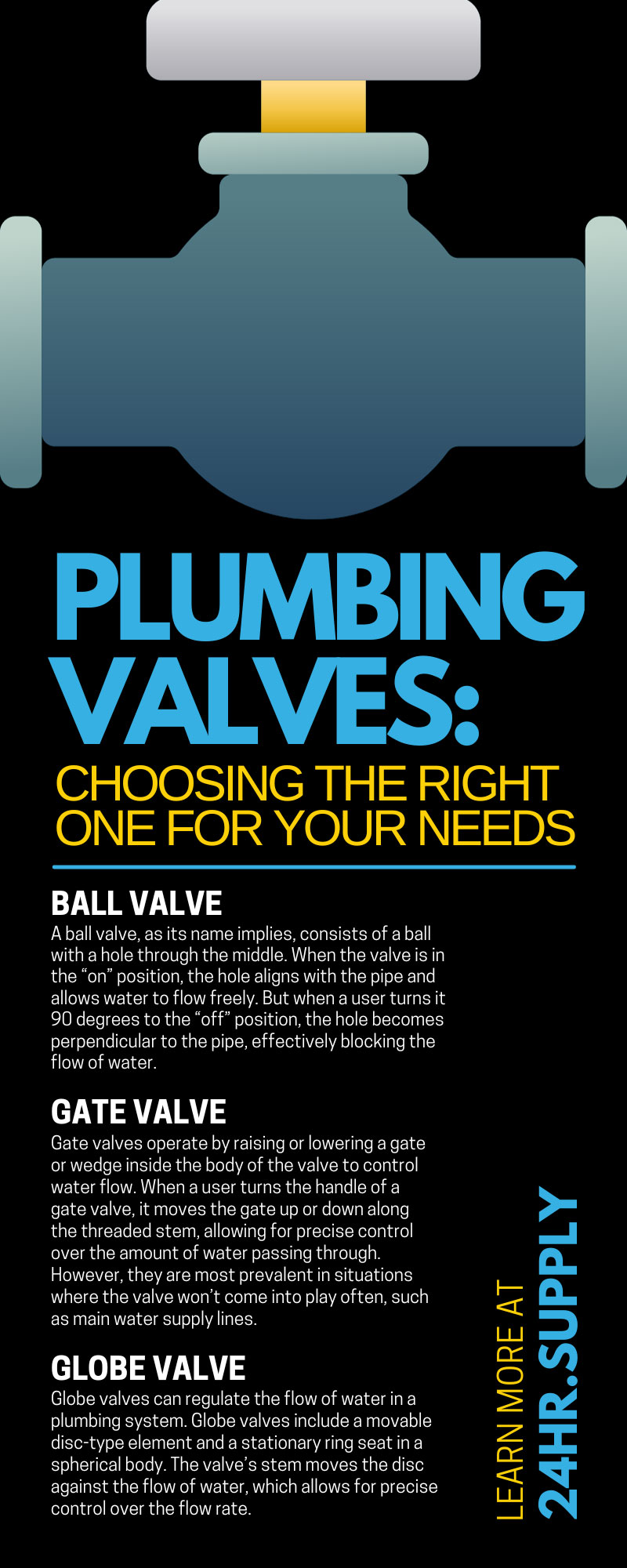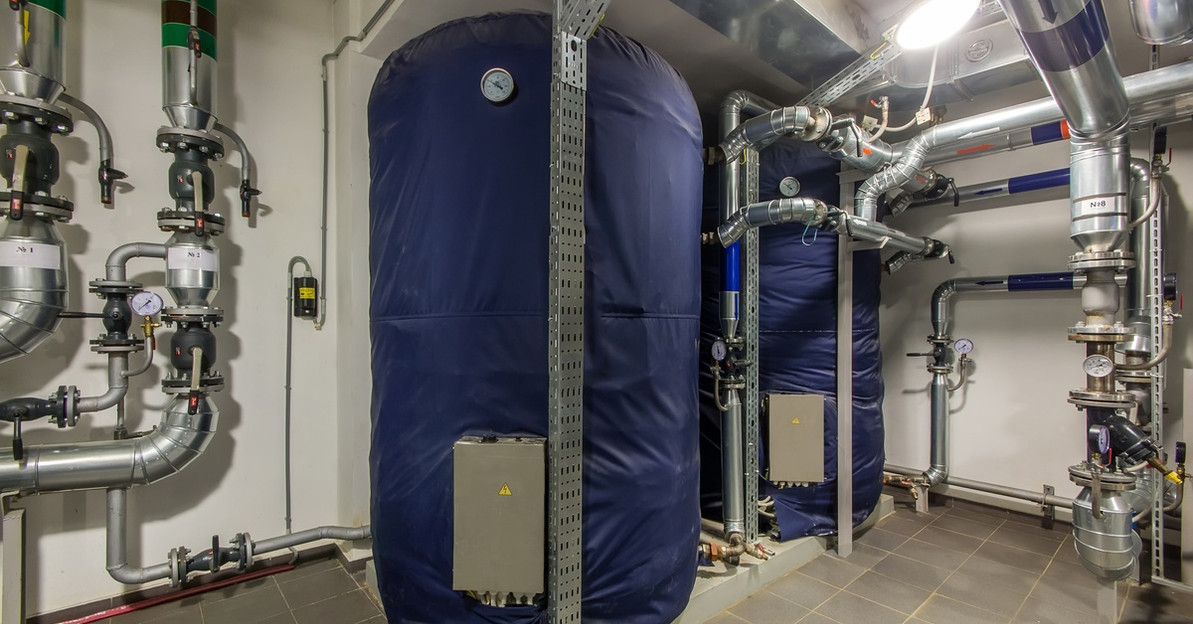Plumbing Valves: Choosing the Right One for Your Needs
No matter what type of plumbing project you’re about to embark on, you shouldn’t neglect the importance of selecting the right valve for the job. As the linchpin of your plumbing system, a valve controls the flow and pressure of the water flowing through your pipes. Choosing the wrong valve could trigger a cascade of problems, from insignificant leaks to substantial water damage.
Luckily, choosing the right plumbing valve for your needs doesn’t have to be difficult. This guide will illuminate the diverse array of valves on the market and discuss their unique roles. When you gain a deeper understanding of a valve’s function in your system, you can make an informed decision about which parts to purchase.
Understanding Plumbing Valves
What is a plumbing valve—and why is it so important?
A plumbing valve regulates, directs, or controls the flow of a fluid by opening, closing, or partially obstructing various passageways within your plumbing system. It serves as a gatekeeper that determines how much water can pass through your pipes at any given time.
Each type of valve performs its own purpose. Shut-off valves stop the flow of water in case of an emergency or for maintenance. Other valves, such as pressure-reducing valves, regulate the amount of water that flows through the pipes to prevent dangerous pressure buildup.
Types of Plumbing Valves
Now that you understand the most basic functions of a valve, which one do you need for your specific application? Let’s take a look at the most common plumbing valves available.
Ball Valve
A ball valve, as its name implies, consists of a ball with a hole through the middle. When the valve is in the “on” position, the hole aligns with the pipe and allows water to flow freely. But when a user turns it 90 degrees to the “off” position, the hole becomes perpendicular to the pipe, effectively blocking the flow of water.
Due to their durability and ability to provide a secure shut-off, ball valves are popular solutions in home plumbing systems that require tight seals.
Gate Valve
Gate valves operate by raising or lowering a gate or wedge inside the body of the valve to control water flow. When a user turns the handle of a gate valve, it moves the gate up or down along the threaded stem, allowing for precise control over the amount of water passing through. However, they are most prevalent in situations where the valve won’t come into play often, such as main water supply lines.
Globe Valve
Globe valves can regulate the flow of water in a plumbing system. Globe valves include a movable disc-type element and a stationary ring seat in a spherical body. The valve’s stem moves the disc against the flow of water, which allows for precise control over the flow rate.
This added control makes globe valves popular plumbing parts in applications where users will regularly adjust the flow, such as showers and faucets.
Check Valve
Check valves play a unique role in preventing backflow in a plumbing system. These one-way valves allow water to flow in one direction—then they close when water tries to flow back in the opposite direction. This function is vital for maintaining the cleanliness of the water supply, as it prevents contaminated water from flowing back into the clean water.
Pressure Reducing Valve (PRV)
PRVs lower the water pressure from the main line to a level that the plumbing system can handle. High water pressure can damage pipes, fixtures, and appliances. A PRV has an adjustable spring-loaded diaphragm that reduces the pressure of the water passing through it and protects the integrity of the system.
Factors To Consider When Choosing a Plumbing Valve
So, which type of valve do you need for your system? That answer depends on a few moving pieces.
Type of Fluid
Different fluids have unique characteristics, and not all valves can handle every type of fluid. For instance, some valves are better equipped to handle water, while others are more suited for gas or oil. Make sure the valve you choose can efficiently manage the fluid moving through the system.
Type of Application
Simply put, why do you need a valve? Different valves suit different functions within a plumbing system.
For instance, if you need a valve for a main water supply line that users won’t interact with often, a gate valve may be the solution for you. On the other hand, if you need a valve for a shower or faucet you use every day, a globe valve can help you regulate water flow.
Water Pressure
Does your plumbing system have high water pressure as it is? Keep that in mind as you shop for valves, and choose one that can withstand the pressure without failing. In some cases, you may want to consider a pressure-reducing valve (PRV) to lower your water pressure to a safe level your system can handle.
Material
You can find plumbing valves in a variety of materials, including brass, bronze, plastic, and stainless steel. The choice of material can affect the valve’s durability, corrosion resistance, and suitability for certain types of water quality.
If you have hard water, for example, a stainless steel valve may be a good choice due to its corrosion resistance.
Operating Temperature
Think about the temperature your new valve will experience—different materials can withstand different temperature ranges. Brass and stainless steel valves typically have higher temperature tolerances than those made of plastic. If you plan to use the valve in a high-temp environment such as a hot water line, choose a valve that can withstand these conditions without degrading over time.
The process of selecting the appropriate plumbing valve for your needs is nowhere near as intimidating as it initially appears. Consider the unique requirements of the application, the size and material of the valve, and its operating conditions to help you arrive at a cogent decision.
Remember that while initial cost is an important consideration, investing in a high-quality valve that offers durability and reliability can save you from pricey repairs in the long run. Consult with the experts at 24hr Supply if you need extra support to choose the right valve for your specific situation.

Recent Posts
-
7 Signs That Your Water Heater Is Leaking
A water heater might not be the flashiest appliance in your home, but when it starts acting up, it c …Jun 27th 2025 -
The Impact of Booster Pumps on Water Quality
Imagine turning on your faucet, only to watch a weak stream of water struggle its way out. It’ …Jun 16th 2025 -
Step-by-Step Guide To Installing a Commercial Water Heater
Installing a commercial water heater is a big project, especially when it directly impacts the comfo …Jun 10th 2025





